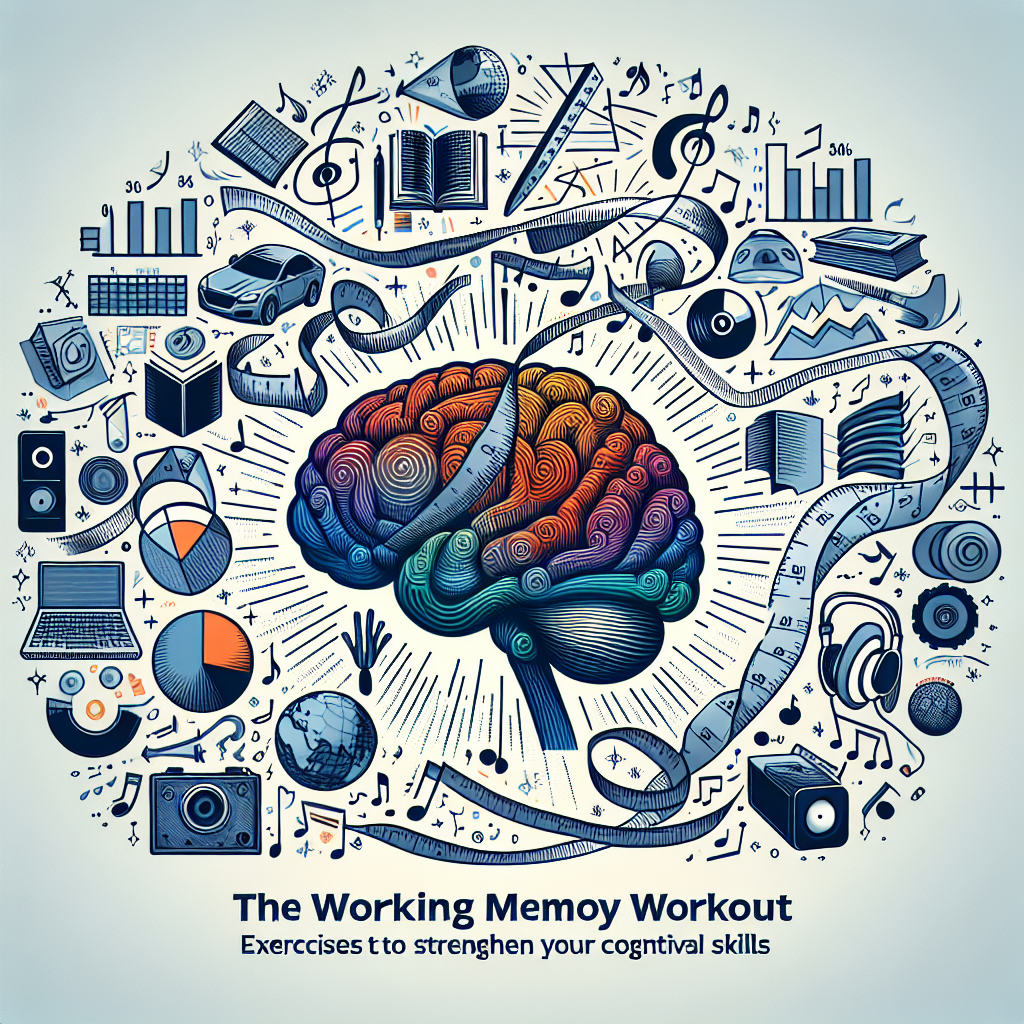
Introduction
Imagine effortlessly recalling names, mastering new skills, or juggling multiple tasks with ease. This isn’t just fantasy; it’s the result of a well-honed working memory. In today’s fast-paced world, where information overload is the norm, enhancing our cognitive skills is more crucial than ever. Whether you’re a student, a busy professional, or simply someone seeking to improve mental acuity, The Working Memory Workout: Exercises to Strengthen Your Cognitive Skills is your roadmap to unlocking your brain’s full potential.
What is Working Memory?
Definition and Importance
Working memory is the brain’s temporary storage system, crucial for reasoning, learning, and comprehension. It acts as a mental workspace, allowing us to hold and manipulate information. Research indicates that strong working memory correlates with better academic performance, problem-solving abilities, and even emotional regulation.
Real-World Impacts
Consider John, a recent college graduate. Despite being intelligent, he struggled in interviews. Poor working memory left him fumbling for answers. After dedicating time to working memory exercises, he excelled during interviews and secured his dream job. John’s journey underscores the significant impact of enhanced cognitive skills on real-life scenarios.
The Science Behind Working Memory
To truly understand The Working Memory Workout: Exercises to Strengthen Your Cognitive Skills, we first need to delve into the science behind it. Neuroscience research reveals that working memory relies on a network of brain regions, including the prefrontal cortex and parietal lobe. Strengthening these connections can enhance overall cognitive function.
Cognitive Load Theory
According to Cognitive Load Theory, our brains have a limited capacity for processing information. When overloaded, our ability to retain and manipulate information diminishes. Thus, engaging in targeted exercises can help us expand this capacity over time.
Exercises for Working Memory
1. Dual N-Back Task
The dual n-back task is a popular exercise designed to challenge your working memory. In this task, you must remember the position of an object and a sequence of sounds over multiple trials.
Benefits: This exercise has shown positive effects on fluid intelligence, enhancing the ability to solve novel problems.
How-To:
- Use online tools or apps that offer dual n-back challenges.
- Start at the easiest level and progressively increase the difficulty.
2. Chunking
Chunking involves breaking down information into smaller, manageable segments, making it easier to remember.
Benefits: This method is especially effective for memorizing long sequences, like phone numbers or lists.
How-To:
- Take a long string of numbers, e.g., 123456789, and chunk it into smaller groups: 123-456-789.
3. Working Memory Games
Games designed specifically to improve working memory are fun and effective. Games like Memory, Simon, or online platforms that provide memory challenges can enhance your cognitive skills.
Benefits: Engaging in these games routinely can improve both short- and long-term memory retention.
4. Mind Mapping
Mind mapping is a visual exercise that helps in organizing information effectively.
Benefits: This technique stimulates both the left and right hemispheres of the brain, enhancing creative and analytical skills.
How-To:
- Start with a central idea and branch out by drawing connections with related concepts.
5. Repetition Techniques
Repetition is a timeless method for reinforcing information in working memory.
Benefits: Regularly revisiting material leads to better retention.
How-To:
- Use spaced repetition tools like flashcards, reviewing material at intervals to enhance long-term memory.
Implementing the Workout
To make The Working Memory Workout: Exercises to Strengthen Your Cognitive Skills effective, consistency is key. Just as physical workouts require regularity for optimal results, cognitive exercises must be part of your daily routine. Aim for at least 15-20 minutes daily.
Sample Weekly Schedule
| Day | Exercise | Duration |
|---|---|---|
| Monday | Dual N-Back | 20 mins |
| Tuesday | Chunking Practice | 15 mins |
| Wednesday | Memory Game | 20 mins |
| Thursday | Mind Mapping | 20 mins |
| Friday | Repetition Techniques | 15 mins |
| Saturday | Review Weekly Progress | 30 mins |
| Sunday | Rest/Light Review | N/A |
Tracking Progress
Use a journal to track your progress. Document improvements in tasks like memory recall or problem-solving speed. This practice not only holds you accountable but also motivates continued engagement with the exercises.
Case Studies
Case Study 1: Students and Academic Success
In a study involving high school students, participants who engaged in regular working memory exercises experienced a marked improvement in their academic performance, particularly in mathematics and language comprehension. By implementing The Working Memory Workout: Exercises to Strengthen Your Cognitive Skills, students not only improved their grades but also gained more confidence in their capabilities.
Analysis: This case study illustrates how critical working memory is in fulfilling academic potential, showcasing its importance from a young age.
Case Study 2: Professional Benchmarking
A corporate team engaged in memory-boosting exercises reported improved team collaboration and problem-solving efficiency. By integrating daily working memory workouts into their routine, they not only enhanced individual cognitive skills but also fostered a collaborative environment.
Analysis: This example underlines the benefits of working memory in professional settings, highlighting how cognitive skills are integral to teamwork and productivity.
Conclusion
In a world full of distractions and ever-increasing demands, honing our working memory can transform the way we process information, interact with others, and achieve our goals. By incorporating The Working Memory Workout: Exercises to Strengthen Your Cognitive Skills into your daily routine, you empower yourself to think more effectively and efficiently.
Your Call to Action
Challenge yourself to work on your cognitive skills daily. Start now, and feel the difference in your personal and professional life. Remember, it’s not just about the workouts—it’s about the champion mindset you develop along the way!
FAQs
1. How long does it take to see improvements in working memory?
Improvements can generally be seen within a few weeks of consistent practice, especially with regular engagement in exercises.
2. Are there any age restrictions for working memory exercises?
No, working memory exercises can be beneficial for all ages, from children to older adults seeking cognitive maintenance.
3. Can physical exercise improve working memory?
Yes! Physical exercise has been linked to improved cognitive function, including working memory, through increased blood flow to the brain.
4. What are some signs of poor working memory?
Common signs include difficulty following conversations, trouble keeping track of tasks or appointments, and struggles with multitasking.
5. Is there a specific diet to enhance cognitive skills?
A balanced diet rich in omega-3 fatty acids, antioxidants, and vitamins is often recommended for brain health, helping support working memory and overall cognitive function.
By engaging in The Working Memory Workout: Exercises to Strengthen Your Cognitive Skills, you’re investing in a brighter, sharper future. Embrace the challenge today!















